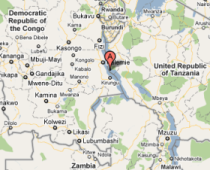Possible effects of global climate change on the ecosystem of Lake Tanganyika
Any change in the air temperature, wind speed, precipitation, and incoming solar radiation induced by increasing greenhouse gasses and climate change will directly influence lakes and other water bodies.
The influence can cause changes in the physical (water temperature, stratification, transparency), chemical (nutrient loading, oxygen) and biological (structure and functioning of the ecosystem) components of the Lake. In this work an influence of the likely effects of the climate change on the above three components of Lake Tanganyika are studied by means of a simple ecological model.
Simulations for the years 2002-2009 have been performed using the wind and solar radiation data from the National Centres for Environmental Protection (NCEP) reanalysis. Various possible climatic scenarios are studied by changing the surface layer depth, its temperature and the wind stress.
Any change in any of the above physical forcing parameters modifies the timing and intensity of the dry season peaks of the biogeochemical parameters. It is seen that the gross production increases as temperature of the surface layer increases and its depth decreases. High temperature and low wind stress, reduces the biomass.
The effects of a slight increase in lake water temperature on the Lake Tanganyika ecosystem might be mitigated by increased windiness, if the latter was sufficient to induce greater mixing.
| Author: | Naithani, Jaya; Plisnier, Pierre-Denis; Deleersnijder, Eric |
Source: Hydrobiologia [Hydrobiologia]. Vol. 671, no. 1, pp. 147-163. Aug 2011.
Document Actions













